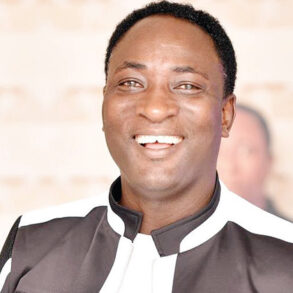A few weeks ago, IFC officially kicked off the Oscar campaign for its critically acclaimed film Monica—a bigger deal than it might appear at first glance. This is a movie of firsts, beginning with its world premiere at last year’s Venice Film Festival, where it became the first competition title in the festival’s 79-year-history to ever feature a transgender lead. Following strong reviews and a rapturous standing ovation, Monica was acquired by IFC and released in theaters this past spring; its Hollywood journey now continues this fall with a modest awards push. The face of that push, star Trace Lysette, adds considerable weight to the endeavor, since no openly trans performer has ever been nominated for an Oscar.
Best known for recurring roles on Transparent and Pose, Lysette just wants a fair shake. She knows that, in this era of year-round, studio-driven campaigning, the deck can be stacked against a film like Monica, which took years to get made on a small budget and which doesn’t have a ton of resources to work with in terms of marketing. (Accordingly, the film received a SAG-AFTRA interim agreement, allowing Lysette to do press as the actors strike continues.) As an executive producer on the project, she’s seen firsthand the tough spot that indies find themselves in right now, amid so much structural change. Monica is the kind of quiet, affecting human drama that the industry is losing more of by the year—but in its careful, specific portrait of a community so underserved by Hollywood for so long, it also demonstrates the form’s enduring vitality.
Monica (streaming on AMC+ and available for digital rental) was directed by the rigorous Italian filmmaker Andrea Pallaoro, whose Hannah won Charlotte Rampling Venice’s best-actress prize in 2017. He gives Lysette the space for a similar showcase here, in the story of a trans woman who returns home for the first time since being kicked out as a teenager. She comes back because her mom, Eugenia (Patricia Clarkson), is declining from Alzheimer’s; she doesn’t recognize Monica as her child, but in the film’s tough exploration of familial love, still develops an unspoken connection with her. Pallaoro’s spare aesthetic and tight framing hinges the emotional impact on his actors’ performances, and Lysette commits with resounding vulnerability and nuance. Opposite the great Clarkson, she shines in the sort of part that’d never been offered to her before.
On this week’s Little Gold Men (read or listen below), Lysette goes deep on the meaning of mounting an Oscar campaign for the film—and what the journey so far has felt like.
Vanity Fair: Back when you took this movie to Venice and this movie got a big standing ovation, you reacted with a feeling of, “Well, what does this mean for this movie and for me? What comes next?” Obviously, a lot has happened in this industry since then, but in terms of those kinds of questions, have you found any answers?
Trace Lysette: For most working actors who bounce around from gig to gig, costar to costar, guest star to recurring, or whatever small roles are building up to whatever fruitful career, I think you’re always wondering, “When do I get to feel safe?” Then when you’re trans and you come from a life of survival, with that extra layer of struggle I would say, you’re always wondering, “When do I get to feel safe?” For me, it really is about survival: It’s keeping my health insurance, it’s wanting to know if I’ll get to think about buying a house someday. As I turn 42 next month, do I ever get to dream about having a house and a family and taking care of my mom? As somebody who grew up poor, single mother, no father in the picture, didn’t go to college—I financed my acting classes on my own in my mid-20s living in New York by myself. I won’t go down the rabbit hole of all my trauma, but I just didn’t get nurtured in the same way that some of my cis actor counterparts did.
I have to be truthful about the fact that it’s just been a different journey for me. Call it a late bloomer, call it catching up, but a lot of trans people feel like they’re playing catch-up in their life…so I guess to answer your question, the answers are trickling in. I woke up this morning to an announcement from Outfest that I’m going to get a Trailblazer Award, which is really sweet. Shirley MacLaine is receiving an award the same night—that’s great company. I’ve had a couple people hit me up about projects they want to develop, just whispers of things, but we’re not really allowed to do anything right now, so I just have to pump the brakes on all of that. But when the strike is over, maybe things will get settled and it will feel a little bit more like, “Okay, things are shifting.”
You’ve done a few studio-backed projects that we can’t talk about here because of the strike, but I bring them up vaguely to flash-forward to Monica, which is very much an independent movie. The kind of acting you get to do in a movie like this, with a director who has a very specific vision and opposite Patricia Clarkson—how did you find yourself challenged or invigorated by that?
There wasn’t any room for phoning anything in. The framing even of the film was just so tight; it really favored the performance, but it also left zero room for anything false. I appreciated that. It was a challenge that I welcomed. I had a very gentle director, Andrea Pallaoro, who was amazing and kind. That in itself is the biggest gift an actor can get, because you feel held and you feel like you can explore. My instrument feels most free when you have that in a director. With Monica, it was so internal and there was so much going on, even the scenes where there wasn’t a lot of dialogue for her; I was trying my best to honor all of that, and she demanded it. She had this quiet strength that I definitely identify with.
Yeah, it’s at times a very dialogue-light movie. What was it like to sit in those moments where there isn’t a lot to say, but you have these incredibly emotional scenes to play?
I love to sit there and work from the gut like that. Being able to do it across from a woman like Patricia Clarkson—who’s had this five-decade career, Academy nominee—was such an honor, and I felt so grateful. We were pretty clear on who these characters were, but I also knew that there was room to explore when I got to set with her, because we work in similar ways. It just was cohesive like that. It was beautiful and raw. There were several scenes where, after they called cut, you’d just look around the room and the crew would be in tears.
How did you feel aligned with Patricia?
It’s good to do what you need to do before you come to set, however, there’s something to be said for letting the wheels fall off and having the confidence to do that. She and I both are willing to do that and explore. And there’s a steadiness to her that I loved—watching her in between takes, even, I was really impressed. It reminded me of the same feelings I felt when I worked with Judith Light for many seasons.
On an unnamed streaming series.
On struck work, or unnamed stuff, yes. [Laughs] But just when you’re around a caliber of actor like that, you get to take away these little gifts of things that you can add into your own arsenal or your own toolkit as an actor. The kinds of things you just have to witness. Again, just the steadiness or seeing how she just focuses on one spot in between takes and doesn’t really waver. It’s this imaginary shield that goes up around her.
You’re also an executive producer on Monica, which is a really good example of the worth and the difficulty of getting indie films made right now. How have you observed the process? You first auditioned for Monica in 2017, right?
I did, extensively. I had to fight for this one. Indie film is, like you said, a fight. It is a labor of love. I feel like I’m still fighting for it to get the same love from the trades that the bigger films get. Our Oscar campaign started last week; nobody announced it. I’m seeing all these other announcements go out for these larger films, and that’s wonderful, but I just want us to be treated the same way. I want to level the playing field, and it’s very hard to do. It’s maddening sometimes. It’s been nice to see IFC step up a little and see that “For Your Consideration” flyer go out to the whole Academy. It made me feel like, “Oh, finally. They understand there’s something here.” This film is special, it deserves some TLC, it deserves eyeballs on it. That’s all we’re asking, is for people to watch it.
We need to constantly think about this as an industry. How do we preserve indie film and not let it fall by the wayside? So much of our industry is about money and power and influence, and who’s got the best publicist, and all of that stuff. It takes away from the art, in my opinion. But here we are. We will fight the good fight because this story’s important, and I have enough messages and letters from trans people around the world to tell me that it’s worth seeing through. It’s a marathon and not a sprint, and we’ve got to just show up.
There hasn’t been an openly trans actor nominated for an Oscar. Do you feel a degree of pressure walking into that scenario in a campaign, when it truly has never happened before?
It’s good pressure, it’s similar to how I felt going to Venice. They hadn’t had a trans lead in [competition] in their 79 festivals as of last year. We do have to knock on that glass ceiling, and trans people, in spite of what the public may think, we’re not new. We’ve been around since the beginning of history, it’s just that our history gets left out. We’ve always been here and deserving, and a lot of times it’s about a lack of access for trans people. Our lot in life is just different. For me, I’ve worked really hard to get to this point. I’m going to continue to show up for myself by any means, and try to stay the course. That’s what I keep telling myself every day.
Was Venice the first time you saw the movie with an audience?
Yes, actually it was. I had seen cuts of it and we’d given notes, fought for a scene or two to get put back in. But that was my first time watching with an audience, and I was blown away when the lights came up. There was this eerie quiet, because there’s no music when the movie ends, it’s just dead silence,. Then the applause happened, and then they just kept clapping and clapping and clapping. Then I started crying, and then they clapped some more.
The thing I really love about your performance in this movie is the way you put it earlier, that quiet strength. You said you feel that in yourself. What about this character and her story did you really connect to?
Like a lot of trans people, I definitely had my own journey with my blood family and my mother. Thankfully, we’re in an amazing place right now, so I don’t like to dredge up the past, but there were some hard years there. I’ve used the word estrangement, and that’s a very unique kind of pain to feel that with your parent, to not know how this is going to end up. But in the end, love won for us, and I like to think that love won for Monica and Eugenia as well. I’m protective of my mom and all of that, because I know that she’s always loved me, even when we had hard times. Something told me deep down, “I know she loves me even if we are not on the best of terms.” In the end, I was right.
I was, I guess, what you would consider non-binary in the ’90s, in high school—rocking women’s hairstyles with long nails. I was wearing some boy clothes and some girls’ clothes. This flaming queen doing her own thing in the Rust Belt of Dayton, Ohio—they didn’t know what to do with me, so I up and left for New York as soon as I could. I deeply, deeply resonate with having to go make your own life for yourself and find the woman that you are…. There’s that one scene of Monica trying to find joy when she’s dancing around the room and getting ready to go out and hit the town. Understanding what that rebellious joy is as a trans woman in a world that feels like it’s always caving in on you—that’s also a universal theme that a lot of people can identify with. We have to find the joy in our lives to keep going.
This interview has been edited and condensed.
More Great Stories From Vanity Fair
This post was originally published on this site be sure to check out more of their content.







